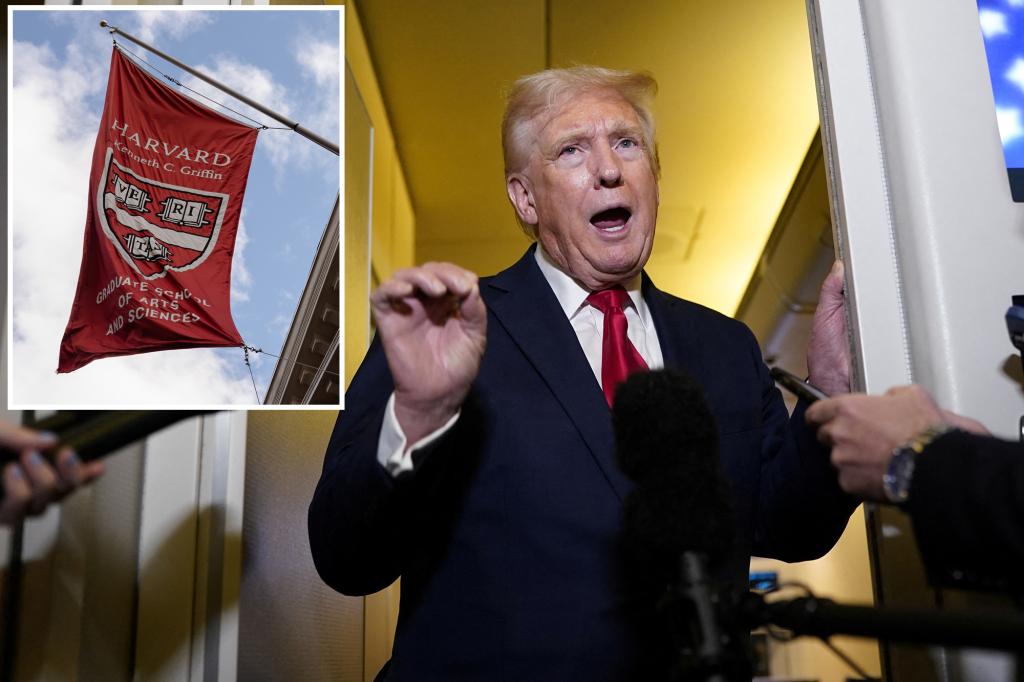The Trump administration threatened on Wednesday to withdraw Harvard University from the federal program that administers student visas if it does not comply with a records request by the end of the month.
Homeland Security Secretary Kristi Noem demanded that the Ivy League school provide DHS with information related to potential “illegal” and “violent” activities Harvard foreign exchange students have engaged in as part of the Trump administration’s crackdown on antisemitism in higher education, in a letter to a school official obtained by The Post.
“It is a privilege to have foreign students attend Harvard University, not a guarantee,” Noem wrote in the missive to the university’s director of immigration services.
“The United States Government understands that Harvard University relies heavily on foreign student funding from over 10,000 foreign students to build and maintain their substantial endowment,” the DHS chief added. “At the same time, your institution has created a hostile learning environment for Jewish students due to Harvard’s failure to condemn antisemitism.”
Earlier this week, Harvard said it would not comply with demands issued by the Trump administration aimed at curtailing antisemitism on campus, resulting in the White House freezing $2.2 billion in multi-year grants and $60 million in multi-year contracts.
Noem, on Wednesday, also announced DHS canceled two grants from the department to the university, totalling another $2.7 million and declared Harvard “unfit” to receive taxpayer money.
“Harvard bending the knee to antisemitism — driven by its spineless leadership — fuels a cesspool of extremist riots and threatens our national security,” she said in a statement. “With anti-American, pro-Hamas ideology poisoning its campus and classrooms, Harvard’s position as a top institution of higher learning is a distant memory. America demands more from universities entrusted with taxpayer dollars.”
Noem threatened to “withdraw the school’s certification” from the Student and Exchange Visitor Program (SEVP) if the institution refuses to comply with the latest Trump administration request by April 30.
SEVP, which falls under the purview of Immigration and Customs Enforcement (ICE), oversees the administration of F and M visas, respectively issued to foreign students looking to enroll in academic or vocational programs in the US.
Noem demanded that Harvard submit information on student visa holders’ “known illegal activity”; “known dangerous or violent activity”; “known threats to other students or university personnel”; “known deprivation of rights of other classmates or university personnel”; and whether any of those activities occurred on campus.
DHS also wants to know whether any Harvard student visa holders have left the school as a result of those types of behaviors and whether any “disciplinary actions” were taken in response to threats or protests from foreign students on campus.
Noem further demanded that Harvard provide “information regarding each student visa holder’s maintenance of at least the minimum required coursework to maintain nonimmigrant student status.”
“Failure to comply with this Student Records Request will be treated as a voluntary withdrawal,” the DHS secretary warned, noting that withdrawal “will not be subject to appeal.”
The letter comes as reports indicate that the Internal Revenue Service is making plans to rescind Harvard’s tax-exempt status.
A final decision on rescinding the university’s tax exemption is expected soon, CNN reported on Wednesday.
The White House, Treasury Department and IRS did not respond to The Post’s request for comment.
The Cambridge, Mass., university has the largest endowment in the country — about $52 billion — from which it earned about $2.4 billion in fiscal 2024.
The endowment proceeds reportedly fund about 37.5% of Harvard’s $6.4 billion operating budget. Annual federal funding ($686 million) makes up 16% of the operating budget. If the tax-exempt status was altered, the endowment income’s tax rate could soar from 1.4% to the standard 21% corporate tax rate — not accounting for deductions — potentially translating to a $525 million annual reduction in funds.
Harvard did not respond to The Post’s request for comment.
Read the full article here


